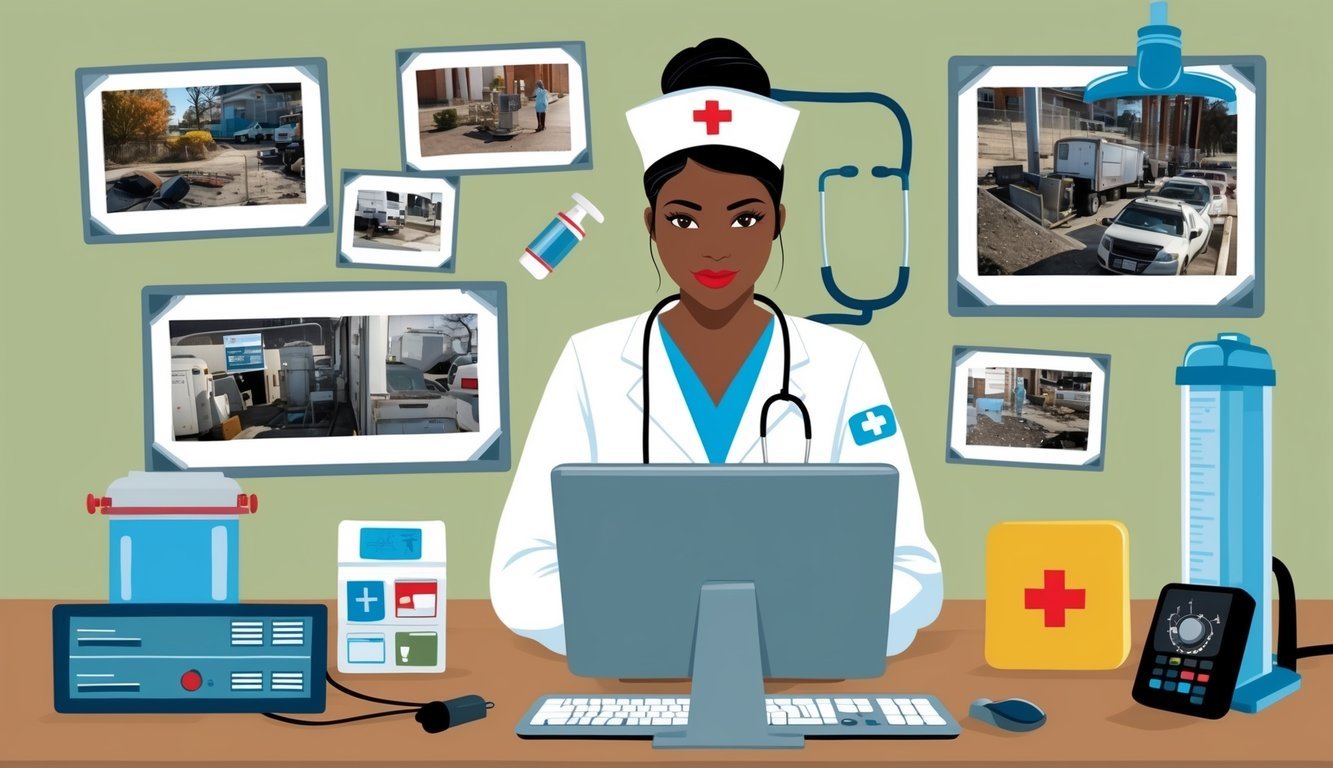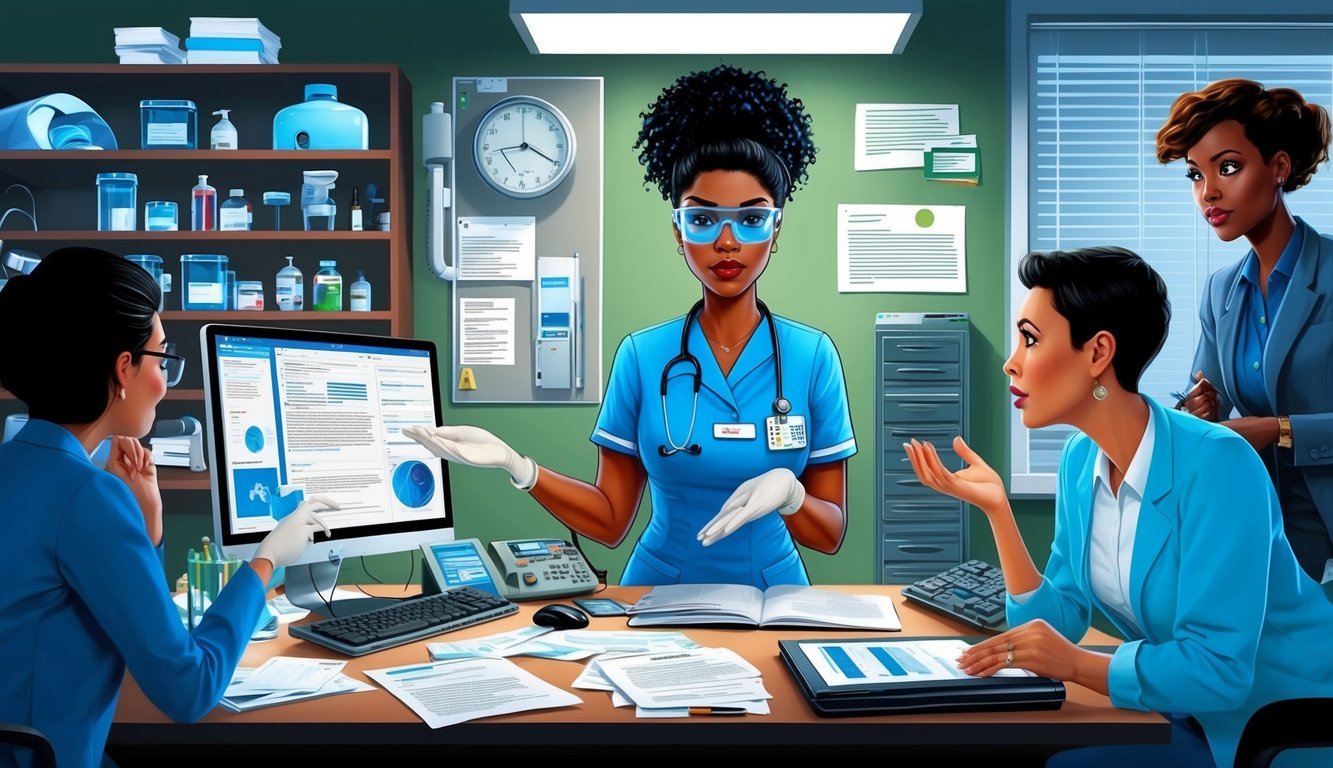Forensic nursing combines medical knowledge with the criminal justice system, providing critical care to victims while collecting evidence for legal cases. As a forensic nurse, you play a vital role in helping both individuals and society by bridging the gap between healthcare and law. This unique field not only requires nursing expertise but also an understanding of the complexities within various legal settings.
In this blog post, you will learn about the diverse career opportunities available in forensic nursing, including roles in emergency departments and legal consultative teams.
You will also discover the benefits of working in this field, such as contributing to public health and ensuring justice for victims.
With a growing emphasis on diversity, equity, and inclusion, this career is more accessible than ever.
Key Takeaways
- Forensic nurses meet the needs of victims while aiding the criminal justice system.
- Career opportunities range from emergency departments to legal consultative roles.
- This field promotes diversity and addresses critical public health issues.
What Is Forensic Nursing?
Forensic nursing is a unique blend of healthcare and the legal system.
It involves caring for victims of crime and using medical knowledge to gather evidence.
Your work can be crucial in helping justice be served.
Role and Responsibilities
As a forensic nurse, you wear many hats.
Your primary duty is to provide care to victims of violence or abuse.
This includes assessing their medical needs and gathering important evidence like photographs and samples.
You often work in settings such as emergency rooms, sexual assault clinics, or correctional facilities.
In addition to clinical care, you are involved in legal processes.
This means documenting findings accurately and possibly testifying in court.
Critical thinking skills are vital so you can analyze situations quickly and make informed decisions.
You also play a role in emotional support, helping patients cope with their trauma.
Educational Requirements
To enter the field of forensic nursing, you need to first become a registered nurse (RN).
This requires completing a nursing program and passing the NCLEX-RN exam.
After obtaining your RN license, pursuing a specialized degree in forensic nursing can enhance your qualifications.
Some programs focus on specific areas such as crime scene investigation or legal issues in healthcare.
Coursework often covers topics like trauma care and evidence collection.
You will also benefit from clinical experience, working directly with patients.
Certifications and Continuing Education
Certification is important for establishing your expertise in forensic nursing.
The International Association of Forensic Nurses offers a certification program.
You can become a Certified Forensic Nurse (CFN) by passing their examination.
This can enhance your career prospects.
Continuing education is also key.
You should stay updated on best practices and new technologies in the field.
Attending workshops or seminars can help you build your skills and knowledge.
Many employers may require ongoing training, so it’s beneficial to keep learning throughout your career.
Career Opportunities
Forensic nursing offers diverse career paths that allow you to apply your skills in various settings.
You can find opportunities in hospitals, law enforcement, and research sectors.
Each area plays a vital role in addressing healthcare needs and legal matters related to violence and trauma.
Hospitals and Healthcare Institutions
In hospitals, forensic nurses coordinate care for victims of violence or abuse.
They are trained to conduct thorough medical-forensic exams.
This involves collecting evidence while providing compassionate care.
Many healthcare institutions offer dedicated roles for forensic nurse examiners, especially in emergency departments.
The role may include:
- Documenting injuries for legal purposes
- Providing expert testimony in court cases
- Collaborating with multi-disciplinary teams to ensure comprehensive patient care
You might also find job postings in various states.
Some positions offer competitive salaries, like the Forensic Nurse Examiner position at UVA Health, with pay ranging from $39.90 to $53.00 per hour.
Law Enforcement and Legal Consultancy
Forensic nurses can work closely with law enforcement agencies, assisting in criminal investigations.
You help collect evidence that is crucial for legal cases.
This position requires effective communication with police officers and attorneys.
In your role, you may:
- Assist in interviews with victims to gather vital information
- Prepare reports and provide insights for investigations
- Serve as expert witnesses during legal proceedings
Law enforcement agencies benefit from your expertise in understanding the implications of trauma on victims.
Your skills contribute to building strong cases against offenders.
Research and Public Policy
You can also pursue roles in research and public policy focused on healthcare services and the criminal justice system.
Forensic nurses often engage in studies that aim to improve patient care standards for victims of violence.
Your contributions may include:
- Conducting studies on the effectiveness of forensic nursing practices
- Advocating for policy changes that support victim services
- Collaborating with organizations to enhance community awareness
Research positions may be available through agencies like the International Association of Forensic Nurses, where you can be part of a global effort to improve forensic nursing standards.
This path allows you to influence practices and policies that impact patient care and justice.
Diversity, Equity, and Inclusion in Forensic Nursing
Creating a diverse and inclusive workplace in forensic nursing is essential for effective care.
Focusing on equity ensures that all individuals receive fair treatment and opportunities.
This section discusses how to cultivate an inclusive environment and emphasize equal employment opportunities within the field.
Cultivating an Inclusive Environment
To foster inclusivity, forensic nursing organizations must prioritize diverse hiring practices.
This effort can include recruitment campaigns aimed at underrepresented groups.
Tailoring training programs can also help staff understand different cultural perspectives.
When you create an inclusive setting, you promote collaboration and openness.
This enables patients from diverse backgrounds to feel comfortable.
Additionally, supportive policies and mentorship programs can enhance the careers of minority nurses.
Important aspects to consider include:
- Cultural Competence Training: Educate staff on various cultural issues.
- Employee Resource Groups: Facilitate support networks for staff.
- Feedback Opportunities: Enable staff to voice concerns and suggestions.
These initiatives help build a sense of belonging for everyone in the organization.
Equal Employment Opportunity
Equal Employment Opportunity (EEO) is a critical element in forensic nursing, ensuring that hiring practices are fair and unbiased.
EEO laws prohibit discrimination based on race, gender, age, and other factors.
It is vital to implement these principles to attract a skilled workforce.
You should monitor recruitment processes for equity by ensuring diverse interview panels.
Standardizing interview questions can minimize bias as well.
Regular training on EEO compliance is also important for all staff involved in hiring.
Consider the following EEO best practices:
- Diverse Job Boards: Advertise openings on platforms that reach various communities.
- Anonymous Resumes: Remove identifiable information to focus on qualifications.
- Regular Audits: Evaluate hiring practices regularly for fairness and transparency.
These practices can help ensure that every qualified candidate has an equal opportunity to join the field.
Benefits of a Career in Forensic Nursing
Choosing a career in forensic nursing offers several advantages.
From the rewarding nature of the work to financial benefits and flexible hours, this field provides unique opportunities for professionals.
Job Satisfaction and Impact
In forensic nursing, you have the chance to make a real difference in people’s lives.
You work directly with victims of crime, providing care that can help them heal physically and emotionally.
Your role often involves gathering evidence and supporting patients in the legal process, which can be deeply fulfilling.
The satisfaction comes from knowing your work contributes to justice and healing.
Many forensic nurses feel a strong sense of purpose.
They play a vital role in bridging medical care and legal needs, making their work both unique and impactful.
This level of engagement can lead to higher job retention rates.
Health Insurance and Financial Benefits
Forensic nursing positions often come with strong health benefits.
You typically receive comprehensive health insurance coverage, which can include medical, dental, and vision plans.
This ensures you have access to necessary healthcare, which is essential in a demanding job.
Additionally, salaries in forensic nursing can be competitive.
Entry-level positions may start at around $60,000, while experienced nurses can earn upwards of $90,000 annually.
Factors such as location and experience level can influence pay.
The combination of salary and benefits can provide significant financial stability.
| Benefit | Description |
|---|---|
| Health Insurance | Comprehensive medical, dental, and vision coverage. |
| Salary Range | $60,000 to $90,000 depending on experience and location. |
Flexible Working Hours
One of the appealing aspects of forensic nursing is the flexibility in work hours.
Many positions offer various shifts, including part-time and full-time options.
This flexibility allows you to balance your professional and personal life effectively.
Working in different settings, such as hospitals or legal facilities, may also provide varied schedules.
You can choose shifts that fit your lifestyle better, whether you prioritize family time or personal interests.
This aspect of the job is essential for maintaining a healthy work-life balance.
Navigating the Job Market

Finding a forensic nursing job requires a targeted approach.
Being prepared and using effective strategies can enhance your chances.
Key areas to focus on include tailoring your resume, utilizing job search techniques, and mastering interview skills.
Preparing Your Resume
Your resume is your first impression.
Start by highlighting your nursing qualifications as a Registered Nurse (RN).
Include specific forensic nursing experiences, such as working in emergency departments or sexual assault clinics.
Make sure to list relevant certifications and any specialized training you have received.
Use strong action verbs to describe your accomplishments.
For instance, mention how you treated trauma patients or provided expert testimony in court settings.
Highlight your ability to work closely with law enforcement.
A clean, well-organized resume format makes it easy for hiring managers to read.
Effective Job Search Strategies
When looking for jobs, utilize multiple resources.
Websites like Indeed can show current openings.
Use specialized job boards that focus on healthcare or forensic roles.
Networking is also crucial; connect with other professionals in your field through events or online forums.
Consider joining organizations like the AAMCN, which can provide job listings and networking opportunities.
Setting up job alerts for specific keywords can help you stay informed about new positions.
Keep track of your applications and follow up when necessary.
Interviewing Techniques for Forensic Nurse Positions
Interviews for forensic nursing roles may differ from standard nursing positions.
Be prepared to discuss your experiences in detail.
You may be asked about handling sensitive cases or collaborating with law enforcement.
Practice answering behavioral questions using the STAR method (Situation, Task, Action, Result).
This will help you structure your responses clearly.
Dress professionally and arrive on time, showing respect for the interviewer’s time.
Also, come prepared with questions that show your interest in the role.
This demonstrates that you’re not just looking for any job but are genuinely invested in the position.
Frequently Asked Questions

This section addresses common inquiries you might have about forensic nursing.
You will find essential information about qualifications, salaries, job responsibilities, and career prospects.
What qualifications are required to become a forensic nurse?
To become a forensic nurse, you typically need a degree in nursing to obtain a registered nursing (RN) license.
Many forensic nursing programs also recommend further education, such as a Bachelor of Science in Nursing (BSN) or specialized training in forensic science.
Certifications, such as those from the American Nurses Credentialing Center, can enhance your credentials.
What is the average salary range for a forensic nurse?
The salary for forensic nurses can vary based on experience, education, and location.
Generally, forensic nurses earn between $60,000 and $90,000 annually.
Those with advanced degrees or specialized certifications may earn more.
The Bureau of Labor Statistics provides insights into nursing salaries across various specialties.
How does one find entry-level positions in forensic nursing?
Finding entry-level positions in forensic nursing can involve several strategies.
Networking with professionals in the field and joining relevant organizations can provide job leads.
Websites like NurseJournal often list job openings specific to forensic nursing, making it easier to apply.
What are the typical job responsibilities of a forensic nurse?
Forensic nurses have a range of responsibilities that include providing medical care to victims of violence, collecting evidence, and documenting injuries.
They may also testify in court regarding their findings and help support victims emotionally.
Working in various settings, such as hospitals or correctional facilities, offers diverse experiences in the field.
What is the job outlook for forensic nursing over the next few years?
The job outlook for forensic nursing is positive.
There is a projected growth of 6% from 2022 to 2032, which is faster than other nursing roles.
An increasing focus on addressing crime and violence means that the demand for skilled forensic nurses will likely continue to rise.
Staying informed through resources like the American Association of Nurse Practitioners can provide updated information on the field.
How can a forensic nurse advance their career?
To advance your career in forensic nursing, you can further your education.
This can be done by obtaining a master’s degree in forensic nursing or pursuing specialized certifications.
Gaining experience in different settings or taking on leadership roles can also help.
Joining professional organizations is another way to advance your career.
This will provide networking opportunities and access to ongoing education, which is vital for career growth.

